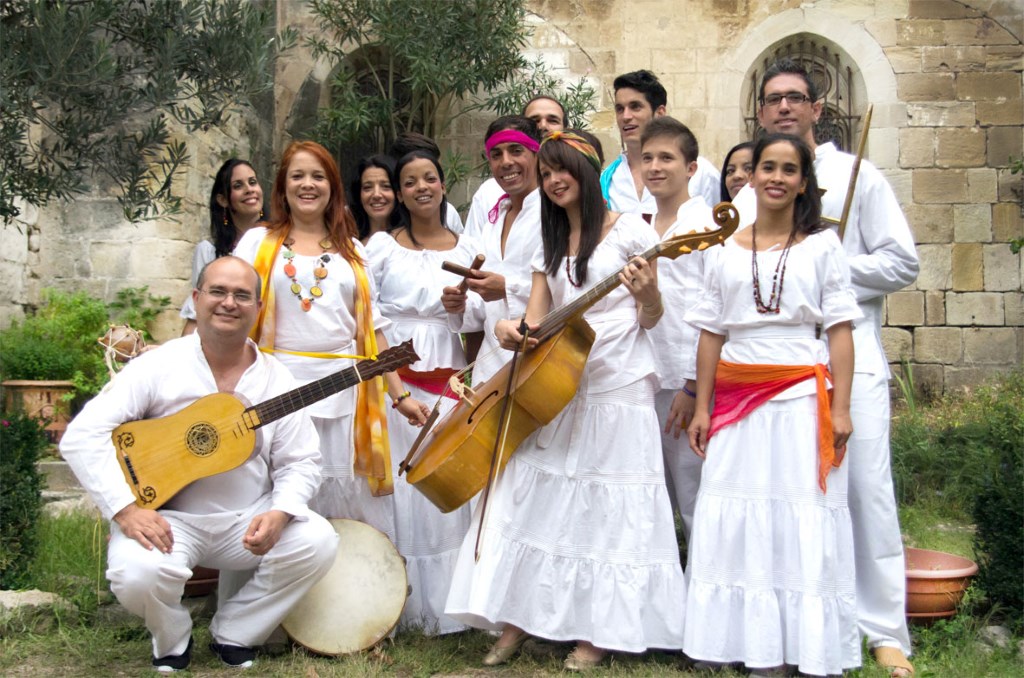The Roots of Afro-Cuban Music
Cuban ensemble, Ars Longa de La Habana, will perform music from colonial days.
Early Music Now continues its 30th year celebration by serving as the premiere host this Saturday evening for Ars Longa de La Habana, a Cuban ensemble visiting the United States for the first time.
Ars Longa was founded in Havana, Cuba, in 1994 by Teresa Paz and Aland Lopez, and since then has toured extensively throughout Europe and Latin America. The ensemble focuses on Latin American and Cuban music of the colonial period, and annually hosts the international Esteban Salas Early Music Festival in Havana. The 16-member ensemble includes singers, as well as performers on viola da gamba, flautas dulces, chirimías, sacabuche, bajón, Baroque guitar, chamber organ, and harpsichord.
For its U.S. debut, the ensemble brings us “Resonances of Africa in the New World” – a program of 17th- and 18th-century music from the colonial period in the Americas, resonating with strong influences from African culture. Music of Juan Gutiérrez de Padilla, Sebastián Durón, Mateo Tolis de la Rocca, Gaspar Fernández and Santiago de Murcia will be featured. Very few of us will have even heard of these composers, who earning their living in the Americas rather than Europe, but were writing music often faithful to Baroque traditions.
But even more vital, slave populations brought musical and religious influences from Western Africa to the Caribbean. New syntheses emerged, substantially adapted to the Christian faith, but open to new rhythms and energy from African traditions. This part of the process has been less explored through Milwaukee concerts, although in 2015 Rumbarroco explored the European influence on Latin American folk music and Afro-Hispanic music performed with Baroque instruments. The Afro-Cuban music to be introduced by Ars Longa de La Habana offers substantial insight into this part of the picture — especially from the sacred perspective.
Its program of Afro-Cuban music is drawn from the ensemble’s 2013 recording titled Gulumbá, Gulumbé: Resonances of Africa in the New World, which highlights the African presence in Baroque music from the New World. The music represents the artistic expression of Cuban composers in the 17th and 18th centuries, which resonates with the poetry and music of the descendants of African slaves. The arrival in the colonies of large numbers of enslaved African people in the 16th century coincided with a Golden Age of Spanish arts. Poets and musicians frequently adopted phrases, themes, and rhythms from folk culture, making use of the new dialects created by the African and Afro-descendant population. The New World will be at the center of this concert, rather than Spain.
Samples here here and here of the work of Ars Longa online reveal an energy and casual celebration rooted in Baroque era forms and instrumentation. David Vernier, a reviewer of an Ars Longa CD was impressed by “the rich, full-bodied, vibrant sound and almost larger-than-life expressive power they achieve. The voices are not only perfectly balanced for ensemble purposes, but project a wonderful array of individual timbres that enhance, enrich, and complement their performing partners and fully serve the music.” It is not clear whether the samples are a good representation of the villancico religioso (religious carol) genre that will be the heart of this concert.
The performance begins at 5:00 p.m. on Saturday, February 18, at UW-Milwaukee’s Helene Zelazo Center for the Performing Arts, 2419 E. Kenwood Blvd. A pre-talk will be offered at 4:00 p.m.
Tickets may be ordered online at EarlyMusicNow.org, by phone at 414-225-3113. Individual senior/adult tickets are $46 in Tier 2 or $29 in Tier 3. Student tickets are $15 in Tier 2 or $10 in Tier 3. (Tier 1 subscription seats are sold out.) Online and phone orders will close at Noon on Friday, February 17.
This concert will be followed by a special Cuban dinner, catered by Cubanitas, Milwaukee’s first entirely Cuban restaurant and featuring live Cuban-style music by Johnny Padilla and Tipica Moderna. More information about this fund raising dinner, and details about reservations, can be found at this web page.
Early Music Now will continue its season on March 18 at 5:00 p.m. with a concert, Sugarloaf Mountain, with Apollo’s Fire. Eight musicians from this award-winning ensemble’s collection of creative artists bring voices, hammered dulcimer, harpsichord, fiddle, wooden flutes, lute, guitar, banjo, and cello to recreate “An Appalachian Gathering” – music with roots in the British Isles that long ago mingled with Southern hymns and African spirituals in the hills of Virginia. The concert will also be held at the Zelazo Center.
Preview
-
A Sacred Choir, 70 Voices Strong
 Dec 14th, 2025 by Martha Brown
Dec 14th, 2025 by Martha Brown
-
Prometheus Trio Goes Bohemian
 Dec 3rd, 2025 by Martha Brown
Dec 3rd, 2025 by Martha Brown
-
Present Music Offers New Choral Works
 Nov 20th, 2025 by Michael Barndt
Nov 20th, 2025 by Michael Barndt



















